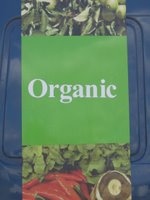
On my weekly visits to the Market, I try to find as much of possible organic produce. There are two suppliers specialising in organic fruits and vegetables, and I always check their bins in the beginning and the end of my tour. I may be eating from the rubbish, but I don’t like eating trash. As a down-and-out foodie I am highly conscious of my diet, and I prefer not to eat pesticides.
But why? Take bananas for example. Since hearing first-hand stories about the amount of chemicals used in banana plantations, I stopped eating non-organic bananas. But lately I looked into it more seriously. It appears that non-organic bananas are among the safest to eat, much more than peaches for example. Very simply, the pesticides remain on the fruits’ skin. As one obnoxious anti-organic website put it: ‘You want to get the pesticides off the banana? Peel it’.
So why eat organic bananas? Because non-organic plantations use enormous amounts of pesticides, which seriously harm the workers; because huge banana plantations, operated by giant agro-businesses like Del Monte, are among the worse in third-world exploitation; because these massive plantations are dangerously unsustainable. All these factors should inform consumers’ decisions. Even when a fair-trade and organic banana is not much ‘healthier’ than a ‘normal’ one, it is healthier for the planet and for the fellow-humans who grow it. Put it another way, when you buy non-organic, you actively support the poisoning of plantation workers and the degradation of their habitat.
But here’s the point: I don’t buy bananas. I find them in the rubbish. And still, when I’m strolling between the skips, I imagine myself as a consumer. Even after four years of skipping, the radical implications of this strange find-and-lose economy are still too confusing for me to take in. It doesn’t make sense to be able to find all this food for free. – But what really doesn’t make sense is the system which produces this waste.
As I’ve said before, the global free-market economy is based on waste no less than it is based on short-term profit. On every visit to the market, I am made painfully aware that the waste I encounter – some of it I salvage and eat, part of my
Commercial Organic agriculture is part of this economy. People buy Organic (or ‘biological’ as they call it in



1 comment:
The Economist is like my stash of crack to be kept in the back of the drawer next to the typical Marxist fare I spend most of my time reading. Anyway, I do really trust what they tell me about brutal dictatorships in the third (sorry, developing) world. They're usually quite fair in assessing the "same guy different tie" nature of American politics, but they were shockingly in favor of the latest "troop surge" in Iraq. As I said, the crack in the back of the drawer. Anyway, I do trust them in certain things... so imagine my plight when I read a cover story in the Economist telling me that organic is BAD for the environment. Well, judge for yourself, I think they make some quite logical (there's there problem) arguments....
http://www.economist.com/displayStory.cfm?story_ID=8380592
Post a Comment